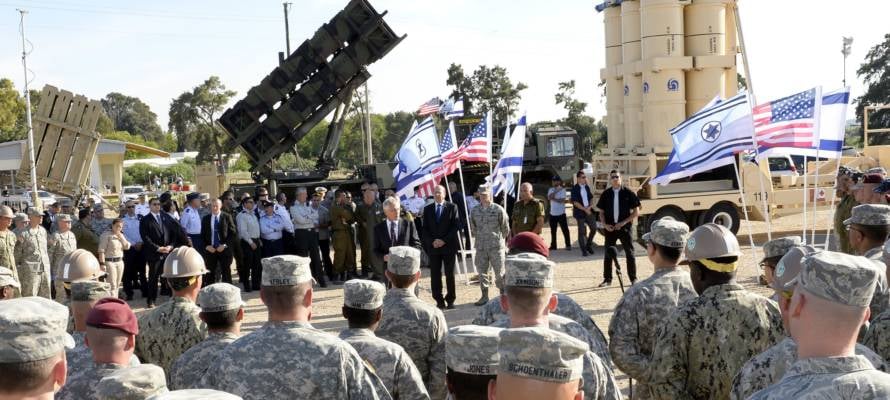Proven Israeli technology should be an urgent U.S. priority to fill the ‘dangerous gaps in American defense,’ say experts on the geopolitical situation in the Mideast.
By Yakir Benzion, United With Israel
Top analysts at a major nonpartisan think tank say the United States should be using more Israeli technology to fill in the gaps in America’s missile defense.
“Missile defense represents an important pillar of Israel’s new national security strategy. Investments in missile defense have enabled the Jewish state to protect itself, by itself,” wrote Jacob Nagel and Jonathan Schanzer of the Foundation for the Defense of Democracies, a Washington, DC-based nonpartisan research institute that focuses on national security and foreign policy.
“The now-proven success will encourage Jerusalem to continue its missile defense-related research, development and production with an eye toward new capabilities against future threats,” the authors said after the recent successful series of tests of Israel’s multilayered missile defense system using the David’s Sling, Iron Dome and Arrow defense systems.
Those tests simulated a variety of advanced threats, including low-altitude cruise missiles, long-range ballistic missiles, unmanned aerial vehicles and more scenarios – most of which are designed to protect against attack by Iran, which has repeatedly promised to “wipe Israel off the map.”
“Success was not a foregone conclusion: There are significant technological and operational differences between these systems, such as maneuverability, range and cost. But the tests proved the systems can work simultaneously,” Nagel and Schanzer wrote.
“The recent tests were a clear message to Iran and its Lebanese proxy, Hezbollah. Israel demonstrated for the first time its ability to intercept a salvo of precision-guided munitions (PGMs), which the Iranian proxy has endeavored to stockpile in recent years. The Israel Defense Forces (IDF) last year identified PGMs as the most lethal conventional threat facing Israel, second only to Iran’s nuclear program.”
The analysts said the recent test also sends a message to Israel’s most important ally, the United State, because American interests in the region are increasingly vulnerable to Iran’s growing arsenal of short- and medium-range ballistic missiles, cruise missiles, unmanned aerial systems and rockets. Iran and its regional proxies have repeatedly used these weapons to attack U.S. personnel and partners in the Persian Gulf, exposing dangerous gaps in American defense.
“Finding fast and practical solutions to fill those gaps should be an urgent U.S. priority. Proven Israeli technology can help,” they said.
The commander of U.S. Central Command, General Frank McKenzie, testified recently that Iran’s inventory of 2,500 to 3,000 ballistic missiles constitutes the primary threat facing the United States and its allies in the Middle East. Those missiles and new Iranian combat drones pose a threat to U.S. forces across the Gulf and parts of Europe.
Those Iranian short-range weapons are already being used against American targets in Iraq, including the missile attack in January that targeted two Iraqi bases hosting U.S. troops and attacks on the U.S. embassy in Baghdad, targeted again earlier this month.
The American Patriot anti-missile systems are at best only a partial solution, but weren’t designed because to protect against short-range PGM rockets, advanced drones and cruise missiles, while Israel’s two proven air defense systems, Iron Dome and the Skyceptor interceptor, have already been proven.
Though Iron Dome was not developed originally to defeat drones and cruise missiles, the recent tests demonstrate the system’s ability to do just that. In 2018, the U.S. Army opted to purchase two Iron Dome batteries. Those systems are now being assessed by the Pentagon. Recent upgrades and proven capabilities make it an attractive option for additional investments.
The second U.S.-Israeli technology requiring serious consideration is the Skyceptor interceptor. Based on the Stunner interceptor developed for David’s Sling and tested successfully this earlier this month, Skyceptor can be fired from Patriot batteries. It was specifically designed to intercept long-range ballistic missiles and low-altitude, maneuverable cruise missiles and drones.
“In Washington, bipartisan support for Israeli missile defense is strong. Indeed, Washington has already invested billions of dollars in support of Israeli missile defense over the span of decades. These investments have paid off for Israel. It may now be time to see whether they can pay off for forward-deployed U.S. forces in the Middle East and beyond. It may also be time for closer cooperation on research and development for other advanced technologies that can benefit both countries,” the authors concluded.
